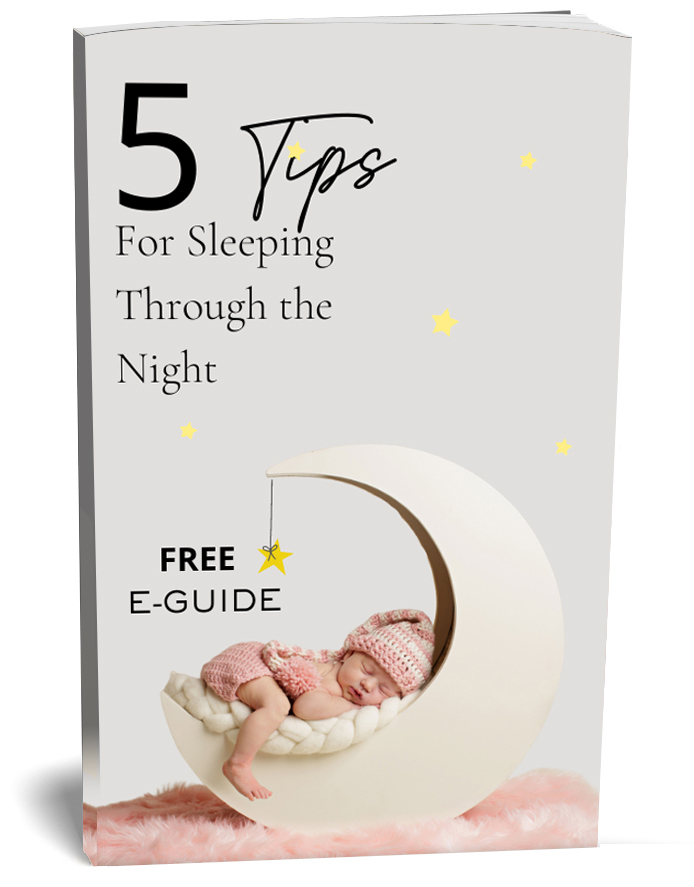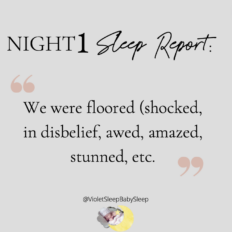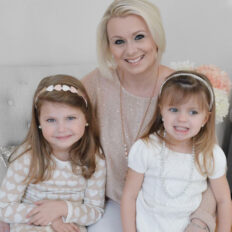Wondering When to Start Sleep Training?
Sleep training. Even the definition of the term varies from parent to parent, and nothing will break down a parenting group comment thread into chaos like bringing it up. For our purposes, when I say “sleep training,” what I mean is simply the process of teaching your baby good sleep habits, so she learns to fall asleep and stay asleep. It should not be confused—or used interchangeably—with the “cry it out” method, or any other named sleep technique. Sleep training is whatever routine best helps your little one get the crucial rest he needs in those early months and years, so he—and you—can thrive. Now that we got the definition down packed, let’s talk about when to start sleep training…
According to pediatric sleep specialist Dr. Jodi Mindell, by three months of age, “[baby sleep habits] are fairly set.” Therefore, starting the sleep training process before this age is the best way to set you and your baby up for success. However, it’s important to introduce bedtime habits that are developmentally appropriate for your baby, so check in with your pediatrician when you decide to start sleep training.
The first goal of early sleep training is to resolve day/night confusion. Depending on your child, this process can take as little as 2 weeks, or can take up to 8 weeks.
To get started, all you need to do is decide on a bedtime routine and stick to it. Babies love repetition, so introducing a consistent routine at night will help ease bedtime anxiety and let your baby know it’s time to start transitioning into sleep mode.
Figure out what works best for you and your baby and then stay with it. Incorporate activities your little one enjoys, which could include:
- A warm, relaxing bath
- Singing a lullaby
- Reading a book
- Cuddling
- A bottle/nursing
- Baby massage
- Anything else that helps calm your baby before bed
Above all else, the key is repetition so your baby knows what to expect. Find what works and stay with it.
“Drowsy but awake”
While it may sound counterintuitive, putting your baby into the bassinet or crib while he is still awake is a crucial part of sleep training. How your child falls asleep at the beginning of the night is how he will fall back asleep after waking in the night—and yes, all humans wake and go back to sleep a few times during the night. You’re teaching your baby that this is normal and nothing to worry about, helping her to feel more secure on her own.
You can start trying this as early as the newborn stage but use your best judgment and never force a very young baby to go to sleep on their own if they clearly need to be picked up and held (remember: you can’t spoil a baby.) Lay your sleepy little one down in their safe sleep space and just see what happens. He or she may surprise you!
Did you know that teaching a baby to sleep independently is one of my specialties? Learn more about my customized sleep plans. I’ll even “hold your hand” through the whole process.
Night Feedings
The next phase of sleep training involves getting through the night without a feed. It’s really important to wait to start this step until your baby is ready, and your pediatrician is really the best person to indicate to you when this is. Most pediatricians and sleep experts agree that most babies are ready anywhere between 3-6 months to sleep through the night, but every child is different, including yours.
In order to start weaning off of night feedings, your baby should be steadily gaining weight, growing in height, and not have any medical conditions. When your baby starts sleeping for longer and longer stretches in between feedings during the night, it usually means he or she is getting ready to start sleeping through the night. At this point, you can start testing whether your baby is truly hungry or just looking for comfort.
When you hear that little cry in the middle of the night, just pause for about 30 seconds and wait to see what happens. Does your baby get more agitated? Chances are, she needs a midnight snack. Does she cry and then settle on her own? She’s probably just transitioning between sleep phases, and it’s best that you let her go back to sleep on her own. Again, all babies are different and you know your baby best, so when in doubt, go with your gut.
Sleep Teaching
When you put these principles into practice together, you’re sleep training. It’s important to keep in mind that just because your baby is at the right age to start sleeping through the night, it doesn’t mean that he will necessarily sleep through the night. Some babies need a little help learning good sleep habits and reversing bad ones. This is where sleep training is important and can really make a difference.
Creating a consistent bedtime routine, following an age-appropriate sleep schedule, teaching your baby to fall asleep on her own, and responding appropriately to nighttime wakings are all crucial pieces in the baby sleep puzzle.
Get a Plan!
Is your baby healthy but still waking up multiple times each night, or having other sleep difficulties? Sleep training may be a great option. If you’re not sure where to start, or think you could use some one-on-one guidance, I am available to help you create a sleep plan based on your child’s individual needs. Learn more about my Baby Sleep Packages.
Bumps in the Road
Sleep training isn’t easy, and like anything else involving raising babies, you can expect some hiccups in the process. Here are some common causes of sleep regressions and the ages at which they occur:
2 Months
- Day/night confusion. This happens early and can take up to 6-8 weeks to get over. Establishing a bedtime routine and sticking to it, plus time is the best remedy.
- Your baby’s sleep-wake cycle doesn’t start to develop until 6 weeks. According to the National Sleep Foundation, by 3-6 months, most infants have a regular sleep-wake cycle. Staying on your bedtime routine from day one will help your baby start to develop this cycle as soon as he is developmentally ready.
- Your baby won’t start producing enough melatonin, the hormone that helps us sleep, until about 2-3 months. Getting to sleep and staying asleep might take some effort before this age.
- Your baby will also hit their first 3 growth spurts during this time (1 week, 3 weeks, and 6 weeks.)
3-4 Months
- First sleep regression. Your baby is learning new skills every day, like kicking, rolling, and turning. She might want to practice at night when she should be sleeping. Imagine if you developed the ability to fly all of a sudden – wouldn’t you be tempted to try out your new superpower instead of going to bed? As always, patience and consistency are key.
- 3 month growth spurt. Just as your baby starts showing signs that he’s ready to sleep through the night, that growth spurt hits and makes you wonder if you’ll ever sleep again. Don’t worry—you will, and so will your baby.
5-7 Months
- Sitting up. Babies love to practice sitting up, particularly when you worked so hard to get them ready and put them to bed. Once your baby masters this skill, this sleep regression will pass.
- 6 month growth spurt. As frustrating as it is, try to remember that these sleep regressions are normal and healthy indicators that your child is growing as he should be. Stick to your routine, and be patient and kind to yourself.
7-9 Months
- Crawling. Babies love practicing this emerging skill in their cribs. Once the novelty of it wears off, your baby will go back to a normal sleep schedule, but until then, it might be a bit harder to get her to go to sleep.
- Babies start to develop an understanding of object permanence around this age, which means they know that something still exists even though it’s not in sight. For sleep, this means your baby might wake up at night and start looking for you. For these times, it’s best to quickly go check on your little one without getting her out of the crib. Lay her back down, give her a pat, and let her know she is safe in her room by herself—then confidently walk out and don’t linger! You may have to repeat this a few times, but eventually, she will get the message.
9-10 Months
- Separation anxiety. Not all babies go through it, but if yours does, it usually peaks around this age and can be triggered by a lot of normal things, like going to a party or event with a lot of new faces. Stay consistent in your routine and radiate confidence—your baby will pick up on this energy.
- Standing. This is another favorite skill for late night practice sessions. You’ll put your little one down in his crib, and a minute later you’ll look at the video monitor and notice he’s standing. Just like with other new skills, once he has mastery and the newness of it wears off, he will go back to a regular sleep schedule.
11-12 Months
- Language development. Babies are taking in hundreds if not thousands of new words every day and may want to practice them when they should be sleeping.
- As your baby transitions away from the infant stage and into toddlerhood, her job is to test boundaries as a natural step toward developing independence. As frustrating as it can be when your child refuses a nap or bedtime just to see what you will do, it is completely normal.
- 12 month regression. Babies at this age are making tremendous progress physically—some are learning to walk, and some are even learning to climb! This can definitely carry over into sleep, but it will pass. Stay calm, stay confident, and stay consistent. You’ve got this!
Don’t Wait!
You can work around these challenges, or better yet, you can figure them into your sleep training plan.  Starting a sleep training routine as early as you can is crucial to helping your child learn and get the rest she needs to fuel her growing body and mind. Keep in mind that sleep training is for babies who are healthy – if your child is sick or uncomfortable, don’t worry about bending the rules. Just focus on making sure your little one is comfortable and resting.
Starting a sleep training routine as early as you can is crucial to helping your child learn and get the rest she needs to fuel her growing body and mind. Keep in mind that sleep training is for babies who are healthy – if your child is sick or uncomfortable, don’t worry about bending the rules. Just focus on making sure your little one is comfortable and resting.
Ready to start sleep training? Not sure when to start sleep training? I offer personalized sleep plans and individual support tailored to your family’s needs. You can take a look at my Sleep Consultation Packages here, and read what other parents are saying about how I’ve helped their little ones sleep through the night.






















